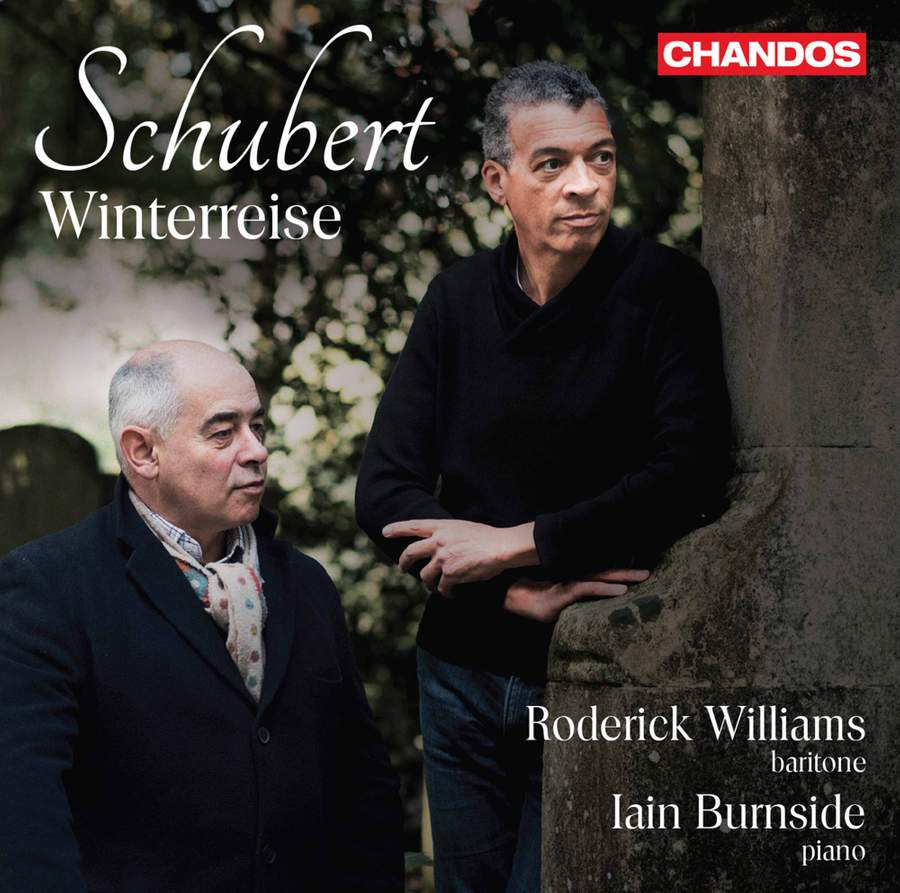SCHUBERT Winterreise (Roderick Williams)
View record and artist detailsRecord and Artist Details
Genre:
Vocal
Label: Chandos
Magazine Review Date: 03/2021
Media Format: CD or Download
Media Runtime: 72
Mastering:
DDD
Catalogue Number: CHAN20163

Tracks:
| Composition | Artist Credit |
|---|---|
| Winterreise |
Franz Schubert, Composer
Iain Burnside, Piano Roderick Williams, Baritone |
Author: David Patrick Stearns
With 100-plus Winterreise recordings on the market, what place could any newcomer occupy in the company of Richard Tauber, Lotte Lehmann, Dietrich Fischer-Dieskau and Ian Bostridge? Answer: one that allows you to rediscover the piece anew – definitely the case here, but in unexpected ways.
Musically intelligent, dramatically resourceful and vocally cultivated, Roderick Williams brings a seasoned Shakespearean authority to the text, having already studied and recorded the piece in his native English as recently as 2018 (Signum, 5/18). Rather than spotlighting key words, Williams sings in unbroken sentences and phrases. Pianist Iain Burnside is so adept at making the listener feel Schubert’s remarkable shifts in emotional colour – especially helpful in maintaining the narrative in more strictly strophic songs – that the two create a satisfying, integrated musical package that doesn’t wear its insights on its sleeve or seek operatic volatility. Given his love of romantic literature, Williams ultimately projects a historically informed philosophy in a pre-Freudian Winterreise whose Biedermeier context gives a veneer to raw emotions.
In contrast to Bostridge’s darker, more tremulous outing with Thomas Adès (Pentatone, A/19), this new set, recorded in July amid the pandemic, literally sets a determined pace in the opening song, ‘Gute Nacht’: the doomed, heartbroken wanderer who goes out into the winter landscape to die does so with a trudge that never drags. That sensibility continues on through to the final song, ‘Der Leiermann’, with Williams relishing the words and all they imply but with Burnside avoiding the near-catatonic qualities of the much-treasured Peter Schreier/Sviatoslav Richter recording (Philips, 2/86, 3/86).
Songs and stanzas that retreat into memories of happier times – such as ‘Der Lindenbaum’ – have cleaner, lower-vibrato vocalism and more buoyant phrasing but are very much the same personality. Observations of the world around him – which, of course, reveal the world within him – are projected with deep engagement but purposeful detachment, as if the protagonist is attempting to understand what’s happening to him. This approach also keeps the cycle’s overall contour from dipping into relentless anguish. Only occasionally a song fails to project itself convincingly, such as ‘Mut!’. As for death, it’s observed without gothic morbidity but as a fact of nature.
In effect, Williams’s portrayal of the wanderer does not ask for pity. Any resignation to his outsider status in society has occurred before his journey has begun. Is this a lifelong outcast who never dared to dream of domesticity, was given a taste of what he had been missing and is unable to return to his previous existence? By no means does this approach supplant more ‘wintery’ recordings but it is recommended as a more objective view of what Schubert achieved.
Discover the world's largest classical music catalogue with Presto Music.

Gramophone Digital Club
- Digital Edition
- Digital Archive
- Reviews Database
- Full website access
From £8.75 / month
Subscribe
Gramophone Full Club
- Print Edition
- Digital Edition
- Digital Archive
- Reviews Database
- Full website access
From £11.00 / month
Subscribe
If you are a library, university or other organisation that would be interested in an institutional subscription to Gramophone please click here for further information.




